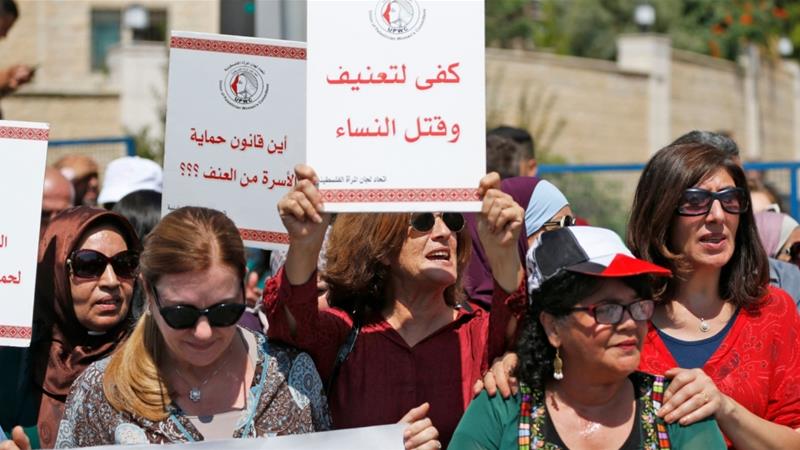Israa Gharib's murder has nothing to do with honour

Israa, like many others before her, was killed because the men in her life believed they owned her and her body.
On Wednesday, thousands of Palestinians across the West Bank as well as in the diaspora, were protesting against the murder of Israa Gharib, a 21-year-old Palestinian woman from the village of Beit Sahour in the Bethlehem area. Israa was an enthusiastic and skilled make-up artist due to be engaged. Her life was cut short last week when she was reportedly murdered by members of her own family for posting a picture on Instagram with her soon-to-be fiance.
It has been claimed that her brothers beat her so hard that as she tried to escape them she fell out of a window and sustained serious spinal injuries that resulted in her hospitalisation. She was then assaulted in the hospital, where, according to witnesses, she was heard screaming and calling for the police.
Her family denied any wrongdoing and claimed that Israa had been possessed by an evil spirit (a Jin) and suffered a heart attack. The investigation into her death by the Palestinian Authority is ongoing but much of the media is already calling it an "honour killing", in other words killing of a woman or girl by a male relative to preserve the family's honour.
The Palestinian minister of women's affairs, Dr Amal Hamad, released a statement on Facebook assuring a review of the legal system in order to offer better protection to women as well as looking at mechanisms to prevent violence before it escalates. Meanwhile Arab activists and feminists on social media have been condemning the horrific murder and insisting that the term "honour killing" should be abandoned and the crime should simply be called murder.
Indeed the problem with the term "honour killing" is that it helps validate the narrative that this crime is somehow exceptional or separate from the more general crime of femicide. The term also encourages people to deem it a specifically Middle Eastern or Asian issue. Yet women are killed all over the world by men who invoke ideas of shame, jealousy, dishonour and humiliation in a display of toxic masculinity. This is why it is important that these crimes be understood and viewed within the context of the structural violence of the patriarchy.
Israa's murder is part of a global phenomenon of violence against women inflicted by intimate partners and/or relatives. This phenomenon is upheld and maintained by patriarchal systems which ensure male dominance and male hierarchies. While the patriarchy affects everyone, its violent manifestations disproportionately affect women.
The World Health Organization (WHO) estimates that one in three women worldwide has suffered physical and/ or sexual violence by an intimate partner. Based on recent figures it is also estimated that globally 137 women are killed by family members every single day. What enables this type of violence is a narrative of male ownership over women and their bodies, in which females and femininity are seen as inferior to males and masculinity.
Israa's story is a horrific and brutal example of the violent manifestations of patriarchy in Palestine and there are few institutional and legal mechanisms in place to protect women from this kind of intimate violence. Many other Palestinian women have suffered various levels of psychological and physical abuse by male partners or relatives. According to the UN, some 30 percent of married women in the West Bank have been subjected to domestic violence by their husbands; in Gaza this number is as high as 50 percent.
It is also important to recognise that the violence of patriarchy also occurs in more insidious ways - seeping into our everyday language and behaviour, affecting in a multitude of ways how gender stereotypes are enforced in familial settings and in the workplace.
This is why feminism cannot simply be an ideology, it has to be integrated into social, political and national values and practised as such. This not only means constantly questioning and pushing back against the norms in our societies and communities that enforce male and masculine dominance, but also organising to dismantle them.
There have to be institutional mechanisms established and legal tools utilised so that perpetrators of such crimes, such as Israa's family members, can be prosecuted and punished. Women cannot stand alone in this endeavour. Men not only have to actively participate, but they also have to centre and follow women. This is how we can collectively honour Israa and all the women who have had their lives taken by a culture of toxic masculinity and patriarchy.
The views expressed in this article are the authors' own and do not necessarily reflect Al Jazeera's editorial stance.
Yara Hawari is the Palestine Policy Fellow of Al-Shabaka, the Palestinian Policy Network.

WRITE YOUR COMMENT